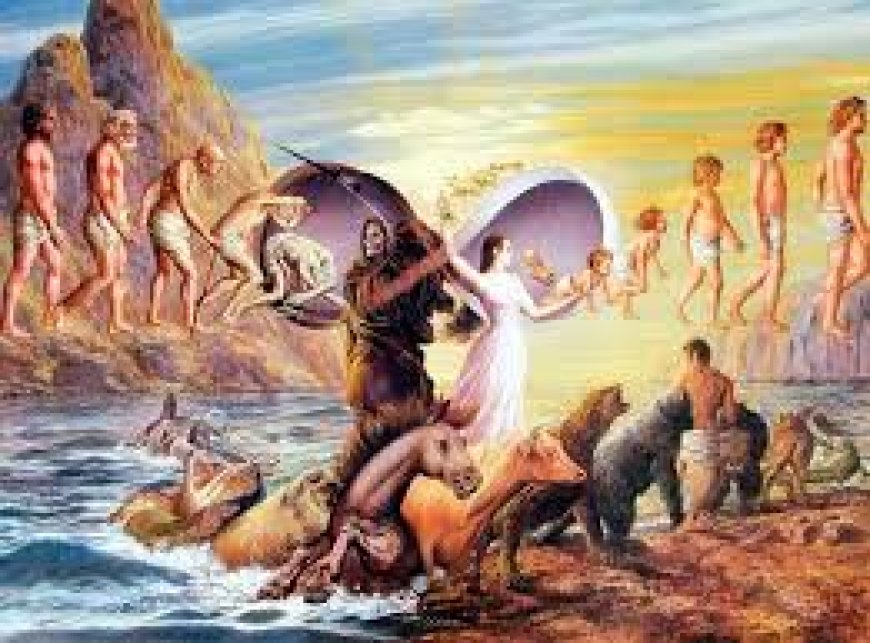REINCARNATION: UNRAVELING THE ENIGMA
The article explores the concept of reincarnation, examining its presence in different religions like Hinduism, Buddhism, Jainism, Christianity, and Islam. It also discusses scientific and philosophical perspectives, citing Plato's theory as an example. Additionally, it highlights various conspiracy theories surrounding reincarnation, such as government suppression of research, alien involvement, mind control, and connections to the Illuminati.

REINCARNATION: UNRAVELING THE ENIGMA.
The whole concept of reincarnation is the belief that after death, the soul is reborn into a new physical form. This concept has captivated human consciousness for millennia.
Reincarnation holds a unique place across different cultures and religions in shaping beliefs, practices, and perspectives on life and death.
This article explores the diverse viewpoints on reincarnation held by major world religions, delving into their historical origins, spiritual underpinnings, and implications for life. We'll also discuss some conspiracy theories surrounding reincarnation…
RELIGIONS
HINDUISM: ETERNAL CYCLE OF KARMA
Reincarnation, a major tenet of Hinduism, is when the soul, which is seen as eternal and part of a spiritual realm, returns to the physical realm in a new body. This continuous cycle of reincarnation is called SAMSARA.
When a person dies, their atman (soul) is reborn in a different body. While some Hindus believe rebirth happens directly at death, others believe that an atman may exist in other realms.
The belief in a soul that transmigrates through multiple lives, based on its past actions (karma), forms the foundation of its religious philosophy. The ultimate goal is to break free from the cycle of reincarnation and attain moksha, or liberation from the cycle of birth and death. Hinduism emphasizes the moral imperative of living a righteous life, as it will determine the quality of one's future rebirths.
The evidence in support of reincarnation comes from two sources:
Jatismaras–people who can remember their past birth or births.
The testimony of the scriptures or saints. Hindu religious literature is full of numerous references to reincarnation.
In Hindu literature, Lord Krishna says in Bhagvad Gita that “one who has taken birth will surely die and one who has died is sure to take birth again”. So this cycle of changing one body after another (called reincarnation) goes on…
BUDDHISM: REBIRTH WITHOUT A SELF
Buddhism shares the Hindu belief in reincarnation but with a significant distinction. Buddhists do not believe in a permanent, unchanging self that reincarnates. Instead, they posit a continuous stream of consciousness that undergoes constant transformation, driven by karma.
Hindu traditions consider the soul to be the unchanging eternal essence of a living being, which journeys through reincarnations until it attains self-knowledge. Buddhism, in contrast, asserts a rebirth theory without a Self and considers the realization of non-self or Emptiness as Nirvana.
Buddhists believe that a person's rebirth is dependent on their previous thoughts and actions. Each intentional action, good or bad, gives rise to karma. Good karma will allow for a good rebirth and vice versa.
Buddhist Concept of Rebirth and Karma
According to Buddhism, rebirth is a fundamental aspect of existence. It posits that after the death of a physical body, consciousness continues on in a new form, whether human or otherwise. The nature of this rebirth is determined by the individual's karma, a concept central to Buddhist teachings.
Karma: Intentional Actions and Their Consequences.
Karma encompasses all intentional and volitional actions, both physical and mental. It is not simply fate or punishment, but rather a causal principle that governs the consequences of one's deeds. Every intentional action gives rise to an imprint or seed within the individual's consciousness.
- Good Karma: Positive and beneficial actions, such as acts of kindness, compassion, and generosity, create positive karmic seeds. These seeds ultimately lead to a more fortunate and fulfilling rebirth.
- Bad Karma:Negative and harmful actions, such as violence, stealing, and deceit, create negative karmic seeds. These seeds lead to an unfavorable and less desirable rebirth.
Rebirth Cycle
The rebirth cycle continues until an individual attains enlightenment, the ultimate goal of Buddhism. During the cycle, a person's consciousness undergoes numerous rebirths in various realms of existence, including human, animal, and divine realms. The specific realm depends on the accumulation and balance of their karma.
- Good Karma Leads to Good Rebirth: If an individual accumulates more positive karma than negative, they are more likely to be reborn into a higher realm, such as the human realm or even the divine realm.
- Bad Karma Leads to Bad Rebirth: If an individual accumulates more negative karma, they are more likely to be reborn into a lower realm, such as the animal realm or the hell realm.
Buddhist teaching views life and death as a continuum, believing that consciousness (the spirit) continues after death and may be reborn.
When it comes to the process of rebirth, different Buddhist traditions explain it differently. Some say that rebirth takes place immediately, while others that it takes 49 days. Some say that there is an intermediate state (Antarabhava) and others that there is not.
In Buddhism, six levels make up the possible range of existence within samsara. These are the realms of the gods (deva), the demi-gods (asura), humans (manusa), animals (tiryak), hungry ghosts (preta), and hell denizens (naraka).
JAINISM: MULTIPLE LIVES AND KARMA
Like Hindus and Buddhists, Jains believe in reincarnation. This cycle of birth, death, and rebirth is determined by one's karma. Jains believe bad karma is caused by harming living things. To avoid bad karma, Jains must practice ahimsa, a strict code of nonviolence.
Jainism holds a strict belief in karma and reincarnation, asserting that every soul goes through a multitude of lives based on their actions.
Unlike Hinduism, Jainism does not acknowledge the existence of a creator deity but rather emphasizes self-control and non-violence as the paths to spiritual evolution.
By practicing these principles, Jains believe they can accelerate their spiritual progress and escape the cycle of rebirth.
The theory of karma and rebirth in Jainism states that “The soul is constrained to a cycle of rebirth, trapped within the temporal world (samsara) until it finally achieves liberation (moksa)”. Liberation is achieved by following a path of purification. Jains believe that karma is a physical substance that is everywhere in the universe.
CHRISTIANITY: RESURRECTION, NOT REINCARNATION
What does the Bible say about reincarnation? The idea of reincarnation is never mentioned in the Bible, however, the scripture does talk of being "born again" as a child of God through His Son, Jesus Christ. The Bible does not mention people having a second chance or coming back as someone or something different.
Instead, the Christian faith holds that after death, the soul enters either heaven or hell based on their belief in Jesus Christ as their savior.
The Bible, in Hebrews 9:27 states that "It is appointed for man to die once, and after that comes judgment."
" The spiritual essence of a person goes to another place immediately after death”(Luke 23:43 ). In other words Christians believe that when they die their “spirit" goes to another place. According to the Bible their spirit faces judgment immediately and either goes to heaven or hell.
After resurrection, some people enter eternal life and others go to eternal death (Matthew 25:46 ).
Christians believe that the resurrection of the body will occur at the end of time when believers will be glorified and reunited with God.
Reincarnation isn't part of the Christian faith, and it doesn't feature in the Bible.
Christian Concept of Resurrection
Resurrection, in the Christian context, refers to the belief that Jesus Christ, after being crucified and buried, rose from the dead on the third day. This event is considered the cornerstone of Christian faith and is central to its understanding of salvation and eternal life.
Death and Resurrection of Jesus
According to the Gospels, Jesus was arrested, tried, and crucified by the Roman authorities. His followers believed that he was the Messiah, the long-awaited savior of Israel. However, his death seemed to shatter their hopes and dreams.
Three days after his burial, Mary Magdalene and other women went to Jesus' tomb to anoint his body with spices. To their astonishment, they found the tomb empty. An angel appeared to them and announced that Jesus had risen from the dead.
Jesus then appeared to his disciples on several occasions, proving his identity and teaching them about the kingdom of God. Forty days after his resurrection, he ascended into heaven, promising to return one day. In Christianity, this is known as “The Second Coming Of Christ"
Significance of the Resurrection.
The resurrection of Jesus is of utmost importance in Christianity for several reasons:
- Conquest over Death:Jesus' resurrection demonstrated his victory over death and the power of sin. It showed that even in the face of death, there is hope for eternal life.
- Justification and Salvation: Through his resurrection, Jesus justified his followers and secured their salvation. His sacrifice on the cross paid the penalty for their sins, and his resurrection proved his divine authority.
- New Life and Transformation:Jesus' resurrection symbolizes new life and transformation for believers. Just as he rose from the dead, so too can they experience spiritual renewal and resurrection to eternal life.
Eternal Life and the Resurrection of Believers
Christians believe that Jesus' resurrection is not only a historical event but also a promise of future resurrection for all who believe in him. According to the New Testament, at the end of time, all who have died in Christ will be resurrected to eternal life. Their bodies will be transformed and glorified, and they will live forever in the presence of God.
The resurrection of believers is not merely a physical event but also a spiritual one. It represents the ultimate triumph over death and sin and the fulfillment of God's plan for humanity's redemption and eternal joy.
ISLAM: BELIEF IN THE HEREAFTER
Islam categorically rejects the notion of reincarnation, emphasizing one lifetime here on earth. While the Quran acknowledges the existence of the soul, it unequivocally rejects the concept of rebirth.
According to Islamic belief, after death, the soul is judged by Allah and assigned to either Paradise or Hell.
After death, most Muslims believe that the soul will enter Barzakh, a state of waiting, until the Day of Judgement. When a person dies, their soul is taken by Azra'il, the Angel of Death then God sends two angels to question the waiting soul.
There is no concept of the soul returning to Earth in a new physical form. Muslims believe in the resurrection of the body on the Day of Judgment when all human beings will be held accountable for their deeds.
The imam explains that those who follow the Islamic faith believe the soul is separated from the body during death. But the soul lives on and may visit loved ones on the seventh and 40th day after death, as well as one year later.
SCIENTIFIC AND PHILOSOPHICAL PERSPECTIVES
Beyond religious beliefs, reincarnation has also been the subject of scientific and philosophical inquiry.
While there is no scientific consensus on the existence of reincarnation, some researchers have explored anecdotal evidence and past-life regression studies, offering intriguing possibilities.
The eminent philosopher Plato was a major exponent of this belief (as was Pythagoras and the Orphic mystery religion(s)). Plato attributed the idea back to his mentor Socrates, who he recounts saying upon his deathbed:
“I am confident in the belief that there truly is such a thing as living again and that the living spring from the dead, and that the souls of the dead are in existence, and that the good souls have a better portion than the evil”. – Plato, Phaedo.
Plato’s Theory.
In "The Republic," Plato presents his theory of reincarnation through the Myth of Er. Socrates tells Glaucon about Er, a man who witnessed the afterlife and reported back.
Plato argues that humans possess an immortal soul that will be reborn. Despite fate's influence, individuals have some degree of choice in their next life. This idea parallels the Tibetan Book of the Dead, which suggests that human folly leads to unwise choices.
Er's story illustrates this concept. Inspired by wealth and power, the first man made a poor choice. Orpheus, consumed by anger, became a swan to avoid being reborn from a woman. Agamemnon chose to be an eagle out of hatred.
In contrast, Odysseus, despite receiving the final choice, carefully considered his options. He valued a peaceful life over worldly pursuits and selected the discarded life of a common man.
The second choice given by Plato was the amount of water to drink at the river Lethe. While each had to drink enough to remove their knowledge of their previous lives, Plato implies that wisdom could remain: “They encamped by the river of unmindfulness, whose water no vessel can hold; of this, they were all obliged to drink a certain quantity, and those who were not saved by wisdom drank more than was necessary; and each one as he drank forgot all things”. – Plato, The Republic.
The concept of reincarnation, while deeply embedded in some spiritual traditions, remains a subject of ongoing debate and inquiry. From its origins in ancient philosophies to its diverse interpretations in different religions, reincarnation continues to fascinate and challenge human understanding. Whether it is viewed as a literal belief, a metaphorical allegory, or a speculative question, the exploration of reincarnation sheds light on our deepest questions about life, death, and the possibility of existence beyond the present moment.
Conspiracy Theories Regarding Reincarnation
In addition to the religious and philosophical perspectives on reincarnation, there are also several conspiracy theories surrounding the concept. These theories often speculate on hidden agendas or suppressed knowledge related to the transmigration of souls.
Government Suppression of Reincarnation Research
One conspiracy theory claims that governments around the world are actively suppressing research into reincarnation. This is said to be done for various reasons, such as to maintain control over the population by keeping them fearful of death or to prevent people from accessing knowledge that could lead to spiritual awakening and social unrest.
Alien Intervention and Past Lives
Another conspiracy theory posits that extraterrestrial beings have been involved in human reincarnation. This theory suggests that aliens abduct humans and implant false memories of past lives in order to manipulate their behavior or conduct genetic experiments.
Reincarnation as a Form of Mind Control
Some conspiracy theorists believe that reincarnation is a form of mind control used by secret societies or powerful individuals to control the masses. They claim that past life memories can be implanted or manipulated to shape people's beliefs and actions, ensuring their compliance and subservience.
Reincarnation and the Illuminati
The Illuminati, a legendary secret society often associated with conspiracy theories, is sometimes linked to reincarnation. Some theorists believe that the Illuminati use reincarnation to maintain their power and influence, ensuring that their members are reborn into positions of authority and control.
Evidence of Past Lives
Proponents of reincarnation often cite various forms of evidence to support their beliefs, including:
- Past life memories: Some people claim to have vivid memories of past lives, often recalling specific details and experiences.
- Birthmarks and physical anomalies:Birthmarks and other physical characteristics are sometimes said to be remnants of injuries or experiences from past lives. A theory states that the face a person has now is the same face the same person fell in love with in their past life.
- Déjà vu and intuition: Déjà vu and intuitive feelings are often interpreted as signs of accessing memories or knowledge from past lives. The feeling of having been to a place before or the feeling that you've done something before when you know very well that you haven't.
While all these experiences can be intriguing, it is important to note that there is no scientific consensus on their validity as evidence of reincarnation.
What's Your Reaction?




































































































